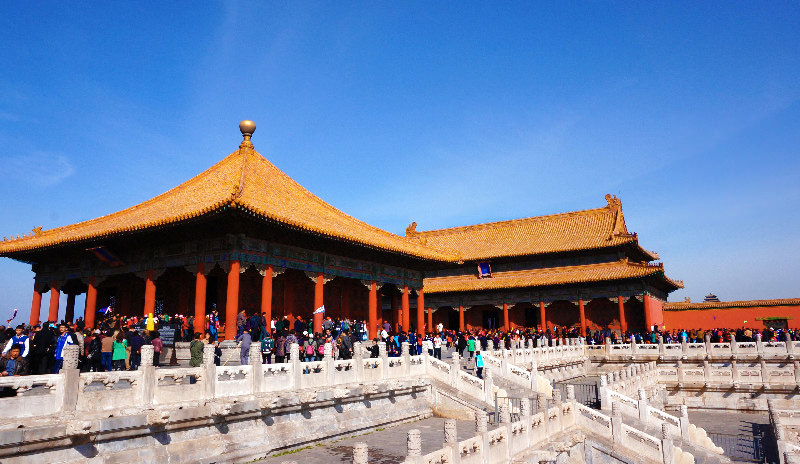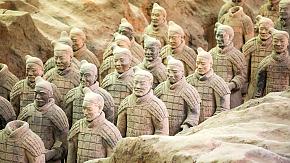Safe Travelling in China
According to the latest available statistics (2016), 21 million foreign visitors arrive in China each year, making it the fourth most visited country in the world, yet many people are unsure about how they will cope and whether China is safe. Half-remembered stories told long ago in school linger in people's minds. Few of them were true even then and certainly aren't true now.
I have spent the last 23 years living and travelling in China and surrounding countries and want to tell you that apart from two very minor incidents (which were more entertaining than worrying) I have never felt in the slightest way threatened. China is probably the safest country that I've travelled in.
RULE NO. 1 - Be Sensible
PUBLIC SAFETY
Flight delays and security checks can't be avoided. Safety concerns are real, but common sense is often the best protection there. Always, remain patient and follow instructions from those whose job it is to look after you. Keep alert, especially in crowded places such as rail stations, airports etc., especially during public holidays. Major tourist destinations in China are normally safe. If they weren't safe, they wouldn't be major, would they?
 The Forbidden City is a popular tourist attraction in China
The Forbidden City is a popular tourist attraction in China
Also, most governments have websites with safety and related travel advice for each country. Check out your government's advice on China. Remember, however, it is their duty to report on worst case scenarios. The vast majority of trips are incident free. Also though, remember things can change, sometimes rapidly, so get regular updates. All the destinations Odynovo Tours recommends are currently safe.
USEFUL INFORMATION
EMERGENCY NUMBERS IN CHINA
POLICE 110
AMBULANCE 120
FIRE 119
Calls to these numbers are free. If you are not sure which you need to call, use 110. In major cities they will usually have someone who can speak English.
CRIME
There is nowhere on earth that has no crime and China has its share. However, crime against foreign visitors is rare and when it does happen usually petty. Pickpockets do hang out in crowded places. Always keep bags etc, where you can see them. Incidents of people having bags slashed have happened, especially bags carried on the back where the user cannot see them. My jacket was once slashed on a bus and a cell phone stolen. To my great it amusement, it was broken, didn't have a SIM card inserted and was a French phone which was unavailable in China and so couldn't be repaired. The hapless thief only did me a favour by throwing the thing away for me. I was more upset about the jacket, but it wasn't new, either.
Be sensible and don't tempt fate. Waving wads of dollar bills about is just going to attract the kind of attention you don't want. Leave expensive jewellery or watches at home. You don't need them in China! Don't bring anything which you would be devastated to lose unless it's absolutely necessary. You can live without them for a couple of weeks or so.
Serious crime and violence involving foreigners is so rare that it doesn't even figure on the statistics. China also has some of the strictest gun controls in the world. Basically, this means that only the military and the armed wing of the police can legally have guns.
HEALTH
Make sure you have comprehensive travel insurance which includes repatriation costs in emergencies. Again, most travellers have no problems, but health issues and accidents can occur anywhere.
Chinese hospitals in the larger cities will usually have someone who speaks English to some degree or other. My local hospital has an excellent translator with better medical English than I do. I have on occasion used Chinese hospitals for minor complaints and been well looked after.
 A Chinese ambulance
A Chinese ambulance
However, for anything serious, there is nothing worse than having to get out your dictionary or phrase book to try to explain what is ailing you, so I would probably want to head to Hong Kong where there are international hospitals with native English speaking staff. Beijing and Shanghai also have some excellent international hospitals with American staff. Your insurance company should be able to give specific advice on dealing with emergency issues and procedures.
If you require prescription medications, please check with your local Chinese embassy or consulate about whether it is permitted for that medication to be brought into China. Regulations can be different. Also, some medications which are only available on prescription in your country may be freely available in China. Don't try to re-import them to your country.
Narcotics and other dangerous drugs are taken very seriously by the Chinese authorities and punishments severe, up to and including the death penalty for smuggling. A few foreigners have been executed and even more imprisoned for lengthy spells. Don't go there!
Related Post: Essential Things to Know Before Traveling to China
FOOD SAFETY
Another common concern is "Will I like the food?" Answer: "Yes, probably." Yet another is "Will I get sick?" Answer: "Probably not."
Again, be sensible. Don't eat food that has been pre-cooked and has sat in the heat for hours. Fortunately, the Chinese people like their food both fresh and freshly prepared, so these canteen-like places are less common than before. Don't drink tap water; the locals don't. Bottled water is available everywhere and is safe. Also, be sure ice cubes are made from purified water. I only ever had food poisoning once - from a Magnum ice cream in a western restaurant in Xi'an. That wasn't fun.
 The Muslim Street in Xi'an is a great place to sample local snacks
The Muslim Street in Xi'an is a great place to sample local snacks
Be extra careful if you have any food allergies or intolerances. Awareness of such issues can be low in some destinations. Also, vegetarianism and veganism aren't well understood everywhere. Dishes which are described as vegetarian may be cooked in pig fat or even contain meat.
PASSPORTS
Your passport is a valuable document, not only to you but also for potential thieves. Chinese law requires all foreigners over 16 to carry their passport at all times. You will need to show it to book into a hotel and to buy train or plane tickets and then need to show again when boarding your train or flight. It is also required to enter some museums and other attractions.
Keep it somewhere safe, but not too obvious while at the same time being accessible to you. It is also an idea to carry photocopies of the details page and your visa just in case. Losing your passport is a major headache, not only in China. Copy any other important documents, too. But only bring documents you absolutely need in China. For most people that will be your passport, insurance information, and tickets.
GETTING AROUND
Licensed taxis are generally safe, although a very few unscrupulous drivers may try it on. You may be approached by drivers in railway station halls or airport lounges. These people are not usually trustworthy. Always use taxi ranks or flag down a taxi moving on the streets. Ensure they switch on the meter. If they claim it's broken, get out. Be careful of the money switchers. These dishonest drivers will take your ¥100 bill then use sleight of hand to switch it for a forgery and hand you back "your bill", telling you your money is no good. I know people who have written down the serial number of their bills and read out the number before handing them over, to avoid this scam. Get a receipt for your ride. This gives the taxi number. Also every taxi is required by law to exhibit the driver's ID and licence card.
China also has a Uber-like service known as DiDi (滴滴). This is very popular, but in practice not really accessible to non-Chinese speakers. You may also encounter motorcycle taxis. You see them parked at the roadside carrying a spare crash helmet. These are not legal and are unsafe. Using them may also invalidate your insurance. Avoid!
Buses are cheap but can be extremely, dangerously busy in rush hours. Chinese bus drivers don't understand the concept of full! There's always room for one or two more.
Trains and planes are usually safe, with the caveat mentioned above. Be extra alert in crowded waiting rooms etc.
GETTING LOST
Getting lost can be part of the fun when travelling. However, finding your way back can be more difficult, especially in a country where none of the signs make sense to you. To avoid spending the rest of your life wandering the streets of China looking for something vaguely recognisable, here are a couple of tips.
Tip 1: When you check into your hotel be sure to pick up a business card from the front desk. In fact, pick up more than one. You will need this to get back should you lose your way. Just show it to a taxi driver. Even the simplest hotels should have them. If not, ask someone to write down the name and address of your accommodation.
Tip 2: In large cities and towns, street signs give not only the name, but also indicate directions. The sign below has the street name in the English alphabet and on either side of that the Chinese characters for north (北) and south (南). This can sometimes help you orientate yourself and save you walking miles in the wrong direction!
 A street sign in China
A street sign in China
North - 北; South - 南; East - 东; West - 西
HOTELS
 Safe exit sign
Safe exit sign
Tourist hotels are safe but, as always, familiarise yourself with your surroundings. Your room should have a map showing you available emergency escape routes in the case of fire. This is usually pinned to the back of the door. There is also usually a list of hotel regulations somewhere in the room. This can also include valuable information.
If you do not want to be disturbed, not only hang up the "Do Not Disturb" sign, but also chain your door. Chinese room staff often ignore the signs. This will not happen in International hotels so much.
TRAFFIC ISSUES
To drive in China, you require a Chinese driving licence. International driving licences are not recognised. This means that hiring a self-drive car is not an option for most visitors.
Until relatively recently, private car ownership was very low in China. This has now changed beyond the imaginable. However, it has brought certain problems. Most drivers are new drivers and therefore inexperienced. Many cities' infrastructure has not kept up with demand, so roads are overcrowded and ill-maintained. At rush hours, I walk everywhere. It is usually quicker!
China has all the sensible, required traffic laws, but they are often poorly enforced, so the accident rate is relatively high, although most accidents are minor.
Be careful when crossing roads. China drives on the right (although some drivers don't seem to know that!), so if you are from one of those countries such as the UK or Australia etc. which drive on the left, then take extra care. Look both ways, just in case, no matter where you are from.
Note that cyclists, including electric scooter riders, are not subject to the same rules as other vehicles and will come in both directions up or down one way roads and will cycle on the sidewalks. In fact, I often see traffic police guiding scooters off the highway and onto the sidewalks. Scooters often go straight through red lights, too.
 Electric bike riders
Electric bike riders
Cars are allowed, in many cases, to turn right against red lights, so even if you are getting the green man light to cross, look out for cars and bikes coming regardless.
At traffic light controlled crossings, always obey the lights. Many people don't, but the risk isn't worth it. On marked but uncontrolled crossings, cars will not automatically stop to let you cross as is required with say the UK zebra crossings.
Beware too of the electric bikes at night. No test is required to ride these and most riders do not use their lights as they gaily speed home on their silent killers, helmet-less and on their cell phones. Several have told me they do not use the lights in order to get extra mileage per charge and that they can see where they are going anyway, blissfully unaware that the lights are not for them to see, but to be seen.
It is possible to hire these bikes. Again, be careful. Doing so may invalidate your insurance.
MONEY MATTERS
 100 yuan bill
100 yuan bill
In the past, counterfeit money was a big problem. It still happens, but less so than before. This is due in part to improvements in design and new anti-counterfeiting measures in the manufacture and printing of notes, but also to China's increasingly rapid conversion to cashless payments. Today, I use my cell phone for almost every payment from a ¥1 bus fare to paying my monthly rent. I can't remember the last time I used cash. However, this option is not open to short-tem visitors, as you need a Chinese bank account which requires a residence permit.
Credit and debit cards are not so widely accepted as in western countries, even in the larger cities. So you are pretty much going to have to rely on cash. The money system is known as RMB (Renminbi) which means "people's currency" and the main unit is the Yuan (元), also known colloquially as kwai (块). The symbol ¥ is often used in informal circumstances. The yuan comes in 100, 50, 20, 10, 5, and 1 yuan bills and a 1 yuan coin. There is also a 2 yuan bill, but it is being phased out and is rarely seen today. Each bill is a different colour and size making them easily distinguishable.
The yuan is further divided into 10 jiao (角), informally mao (毛), with 5, 2 and 1 bills and 5 and 1 coins. With inflation, these are becoming worthless, so are becoming rarer although you do occasionally see them.
Only change money at banks – they all offer the same rate, set centrally. Street money changers are illegal and very risky.
No one will be offended if you scrupulously examine every bill you receive before leaving shops or even in banks. In fact, it is expected.
 BBQ
BBQ
Many years ago in Xi'an, I decided to eat some of the wonderful, charcoal grilled, cumin and chilli lamb skewers for which western China is famous. I asked the price at the street stall and the man said 5 jiao per skewer, the correct price at that time. When I was present the bill, the price had jumped to five yuan each – ten times higher - with the vendor pretending that I had misheard when I asked. I remonstrated and several Chinese customers came up and lambasted the vendor for his mendacity, then one man insisted on paying my correct bill himself, just to prove that not all Chinese are thieves. The vast majority of people in China are honest, friendly and kind.
Please remember that all these problems I mention here are possible problems and not likely problems and being aware of the possible is the best way to avoid them. And I want to repeat – China is probably the safest country I've travelled in.
Also, please remember that Odynovo is here to answer all your questions about travel in China and many other destinations and can custom design your visits to your personal preferences and wishes.
Safe and happy journey!
Quick Question
What Our Clients Say
Explore the latest verified reviews of Odynovo's travel services on Tripadvisor, Google, Trustpilot, Product Review and more trusted platforms.





